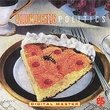| All Artists: Luciano Berio, John Jacob Niles, Kurt Weill, Juilliard Ensemble, Cathy Berberian, London Sinfonietta Title: Berio: Recital I for Cathy / Folk Songs / 3 Songs by Kurt Weill Members Wishing: 2 Total Copies: 0 Label: RCA Victor Europe Release Date: 2/24/1995 Album Type: Import Genres: Folk, Special Interest, Pop, Classical Styles: Vocal Pop, Opera & Classical Vocal Number of Discs: 1 SwapaCD Credits: 1 UPCs: 090266254026, 009026625402 |
Search - Luciano Berio, John Jacob Niles, Kurt Weill :: Berio: Recital I for Cathy / Folk Songs / 3 Songs by Kurt Weill
 | Luciano Berio, John Jacob Niles, Kurt Weill Berio: Recital I for Cathy / Folk Songs / 3 Songs by Kurt Weill Genres: Folk, Special Interest, Pop, Classical Cathy Berberian, singer and wife of Luciano Berio, was one of music's true originals. Equally adept at Monteverdi and the wildest effusions of the avant-garde, her performances brought her husband's music to new and apprec... more » |
Larger Image |
CD DetailsSynopsis
Amazon.com Cathy Berberian, singer and wife of Luciano Berio, was one of music's true originals. Equally adept at Monteverdi and the wildest effusions of the avant-garde, her performances brought her husband's music to new and appreciative audiences, while permitting Berio to create some of his most gripping work at the same time. Folk Songs is exactly what the title says--a collection of folk songs from around the world which gives Berberian the opportunity to demonstrate her ability to sing in different languages and styles. Recital 1 is something else again--a monologue for soprano that reveals the slow disintegration of her personality. It's a nervous breakdown in music. Berberian performs everything on this disc brilliantly. --David Hurwitz Similarly Requested CDs
|
CD ReviewsWide range from an incredible artist Marcos Saboya Santos | 09/10/1998 (5 out of 5 stars) "I'd heard so much about Cathy Berberian that I jumped at the chance to buy this CD. I was particularly interested in what she did with the Folk Songs (since I'd worked on them myself). She is subtler than I expected, but always clear in her interpretation. She has a surprisingly youthful sounding voice, and I suspect she was something of an actress (Recital I)! The range goes from avant garde (Recital I) to show tunes (Kurt Weill), with everything else in between, and she performs all equally well. The reviews sum it up well." The best Berio's singer Marcos Saboya Santos | Rio,brazil | 10/15/2007 (5 out of 5 stars) " The more traditional Folk Songs was a display piece for her facility with languages.In this suite those who know Berio as an avant-garde composer ranking with Pierre Boulez, Luigi Nono and Karlheinz Stockhausen will discover him in an unaccustomedly light mood. Berio made these arrangements as ':a tribute to the extraordinary artistry" of the American singer Cathy Berberian, a specialist in Berio's music whose musicality, intelligence and perhaps unique virtuosity and range of tone color have made her world famous as an interpreter of the most difficult works of the avant-garde. One cannot really classify either the first song, Black Is the Color of My True Love's Hair, or the second, I Wonder As I Wander, as a genuine folk song. In fact, John Jacob Niles, the Kentucky-born singer and scholar, whose education included classes with Vincent d'Indy at the Schola Cantorum in Paris, composed them in Elizabethan modes and made them famous by singing and recording them. Berio's suite opens with a viola, free of bar lines and rhythmically independent of the voice, evoking a country fiddler. Harmonics from the viola, cello and harp contribute toward the "hurdy-gurdy sound" Berio wanted to accompany the second song. Armenia, the country of Miss Berberian's forebears, provided the third song, Loosin yelav, which describes the rising of the moon. In the old French song Rossignolet du bois, introduced by antique finger cymbals, the nightingale advises an inquiring lover to sing his serenades two hours after mid-night, and identifies the "apples" in his garden as the moon and the sun. A sustained chord colored by the striking of automobile spring coils bridges this song to the next one, the old Sicilian song A la femminisca, sung by fishermen's wives as they wait at the docks. Like the first two songs, the sixth, La Donna ideale, and the seventh, ll Bello, come not from anonymous folk bards but from Berio himself, who wrote them in 1949 at the age of 24 for a Fulbright Fellowship voice student in Italy named Cathy Berberian. The old Genoese-dialect folk poem The Ideal Woman says that if you find a woman at once well-born, well-mannered, well-formed and with a good dowry, for God's sake don't let her get away. The Ball, another old Italian poem, says that the wisest of men lose their heads over love, but love resists the sun and ice and all else. Metettu di tristura comes from Sardinia and apostrophizes the nightingale: "How you resemble me as 'I weep for my lover... When they bury me, sing me this song." The next two come from perhaps the most famous of all folk-music arrangements, Joseph Canteloube's Chants d'Auvergne, in auvergnat dialect. Malurous qu'o uno fenno poses the eternal marital paradox: he with no spouse seeks one, and he with one wishes he had none. A cello echoing the improvisation at the opening of the suite introduces Lo Fialaire, in which a girl at her spinning wheel sings of exchanging kisses with a shepherd. Miss Berberian discovered the last song, here called simply Azerbaijan Love Song, on a 78-r.p.m. 10-inch disc from the Soviet Asian republic of Azerbaijan, sung in that nation's language except for one verse in Russian, which a Russian-speaking friend told her compared love to a stove. Miss Berberian sung, purely by rote, the sounds she transcribed as best she could from that scratchy old record. She knew not one word of Azerbaijani. " Classic performance Marcos Saboya Santos | 06/25/2001 (5 out of 5 stars) ""Recital I for Cathy" looks back into music history, quoting from famous operatic and recital pieces, while mainting a modern aesthetic, jumping from singing to speaking. It is schizophrenic and absurd, yet retains a certian homogeneity. A classic work with the famous Cathy Berberian, for whom it was written. The Folk Songs, too, are enjoyable--both recognizable and new."
|




